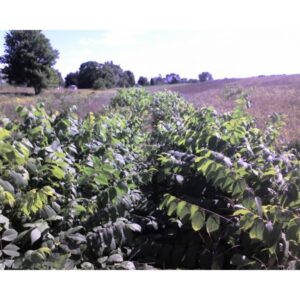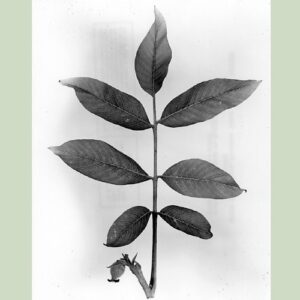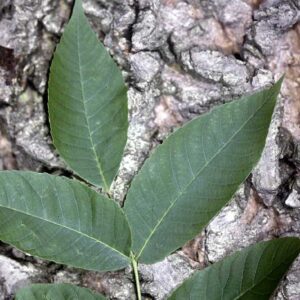Wholesale Walnut Trees in Michigan for Sale
Cold Stream Farm grows and supplies wholesale walnut trees from our headquarters in Free Soil, Michigan. We are the proud seller of a variety of walnut species including black walnut, English walnut, and white walnut transplants with no minimum quantity required for purchase.
Please check the current availability of our walnut trees in our online catalog to get started with your order. Orders are best placed in spring when we have the largest supply of wholesale walnut trees. Restrictions may apply in some states, so please contact us if you have any questions or concerns about your shipment.
About Our Wholesale Walnut Trees
Grown from bare-root seedlings, we offer three species of walnut trees available to purchase at different stages throughout their lifecycle. Shipments can be arranged for multiple species and included with other deciduous plants.
Black Walnut (Juglans nigra)
Cold Stream Farm has very limited availability of Black Walnut (Juglans nigra), a native North American species. Black walnut, also known as the eastern black walnut or the American walnut, is a large, self-pollinating plant that reaches heights of up to 100 feet. It is one of the most abundant tree species in the eastern United States thanks to its competitive fast-growth techniques and natural durability.
The plant is recognized by a distinctive odor contained in its leaves, stems, and fruit husks which can be described as both pungent and “spicy.” Fruit and nuts from the black walnut tree attract birds and small mammals. The wood is very strong and is commonly used in furniture, paneling, and carpentry.
Before planting black walnut trees, it is important to consider the fact that the roots secrete juglone poisoning, which can affect nearby plants. Do not plant black walnuts near tomatoes, apple trees, or young pines.
English Walnut or Carpathian (Juglans regia)
Second, Cold Stream Farm supplies wholesale English Walnut (Juglans regia) trees, available in different sizes throughout the year. The English walnut shares many of the same characteristics as the black walnut, with the exception of being native to Europe and Asia.
The plant has many nicknames and may be referred to as the English walnut, Carpathian walnut, common walnut, Persian walnut, and more.
English walnuts are edible, both for humans and wildlife. Although some people may be allergic to the nuts, English walnut trees have been used as food and a resource for centuries around the world. Please note that there are shipping restrictions to Arizona, California, and Texas on English walnut orders.
White Walnut or Butternut (Juglans cinerea)
Lastly, Cold Stream Farm grows and sells White Walnut (juglans cinerea) trees, which may also be known as butternuts. Native to eastern North America, white walnut trees are generally smaller than the English and American species, growing only to an average mature height of about 60 feet.
Like other walnut species, the butternut fruit is edible and also used in dye-making. Wood from white walnut trees is also very strong and popular for lumber. Compared to black and Carpathian walnut trees, Butternut plants are the least shade tolerant and may have difficulty competing in a canopy with heavy foliage.
Typical Walnut Tree Growing Conditions
All walnut tree species belong to the genus Juglans which grow in both eastern and western hemispheres. In general, they are very competitive species that grow best in full sunlight conditions. They are very adaptable to different soil types but thrive best in rich, moist, and well-drained areas.
Depending on the species of walnut tree, successful plants can be grown with little to no maintenance in USDA hardiness zones 3 through 9. Of our stock, English walnut trees are the most particular, growing best in zones 5, 6, or 7.
Ecology & Wildlife
Walnut plant parts and products are eaten by a wide variety of insects, birds, and mammals. Some walnut trees are very popular with caterpillars and moths, while others are the favorite among squirrels and mice feasting on the nuts.
Most Popular Uses for Walnut Trees
In North America, walnut trees are typically grown ornamentally, as the large-leaved plants are commonly found in parks and large developed areas. The edible nuts are both eaten raw as well as prepared in several different culinary styles.
Walnut wood is widely accepted as one of the best materials for woodworking and woodcarving. The soft, durable wood has been used in paneling and construction as well as in products like guns and musical instruments.
Purchase wholesale walnut trees from Cold Stream Farm.
If you are ready to move forward with your walnut tree order, feel free to purchase your desired quantity and species online with us today. Cold Stream Farm is available for any and all questions regarding current and future walnut tree orders. Please contact us during ordinary business hours for information on shipping restrictions and state regulations, as well as retail and wholesale pricing.



